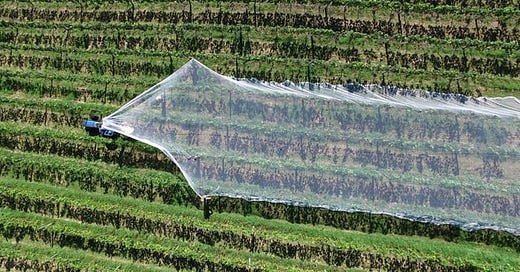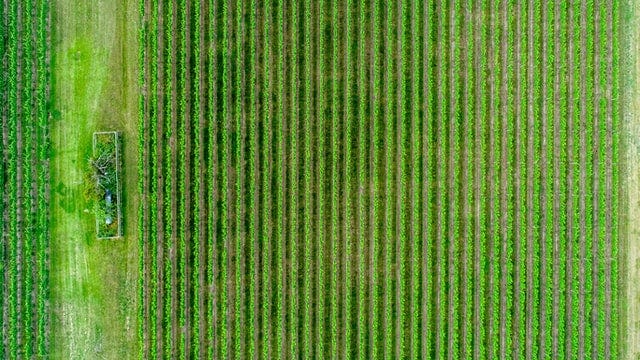How AI is reinventing a 10,000-year-old industry to save the planet🌾
Hello,
This newsletter will take you about 5 minutes to read.
I. Spotlight: How AI is reinventing a 10,000-year-old industry🌾
Sustainability is not just good for the planet but is an attractive business opportunity.
It’s estimated that the Paris agreement will unlock economic activity worth $13.5 trillion in energy efficiency by 2030. Innovations to realize the UN Sustainable Development Goals (SDG) could open up another $12 trillion worth of business by 2030.
Clearly, there’s money to be made in sustainability.
Artificial Intelligence (AI) is a strategic enabler and differentiator to build successful businesses in areas such as water, agriculture, climate, energy, or biodiversity.
Let’s look at one of these spaces to find why things badly need some disruption. With examples, we’ll see the transformative potential of AI and how it’s saving the planet.
(Photo by Colin Watts on Unsplash)
The ugly side of agriculture
The agriculture industry misuses resources. Take water, a key ingredient. Irrigated agriculture accounts for 70% of water use worldwide. Yet, this precious resource is used grossly inefficiently - close to 40% of it is wasted.
Similarly, fertilizers are used non-scientifically - the wastage here is almost 60%. Additionally, fertilizer waste is flushed into water sources, and it leads to greenhouse gas emissions (GHG). Nitrous oxide, the GHG that fertilizers generate, is far deadlier than carbon dioxide - it warms the atmosphere about 300 times faster.
Not surprisingly, agriculture alone contributes to 15% of global greenhouse gas emissions.
How technology is improving this 10,000-year-old industry
Technology is helping optimize the use of agricultural resources. We see targeted interventions across the entire farming lifecycle - from crop selection and soil preparation through harvesting and storage.
This is called precision agriculture.
Imagine getting recommendations from a machine on what to sow, when, and where. Drones monitor the crops aerially, and AI helps identify areas that need water and fertilizer. Data from sensors, soil probes, and farm equipment helps manage crops autonomously.
For example, Prospera is an Israeli startup that offers a digital command center to manage an entire farm. Prospera analyzes aerial imagery using computer vision. The real-time insights help improve yield across the $5 B worth of farm produce it monitors.
Today, we are in the age of hyper-personalization for individual consumers. Agriculture has taken a cue from this space to personalize care for every plant!
A US-based startup, Blue River, has developed a patented See & Spray technology. As tractors move through a farm, a camera inspects every plant and detects if it’s a crop or a weed. It then makes a real-time decision to spray fertilizer or pesticide selectively.
Blue River reports that this precision technology has helped save its customers over 90% cost on chemicals used, apart from delivering huge labor savings.
(Photo by Alex Wigan on Unsplash)
Achieving the triple bottom line - business, society, and planet
From the examples above, it’s a no-brainer that tech-enabled precision agriculture is a must-have on every farm. On the other hand, the startups building such AI solutions aren’t just growing fast, but they are also turning hot acquisition targets.
Both the companies cited above, Blue River, and Prospera were acquired for $300 million each. The buyers are large agriculture engineering product makers - Valmont Industries and John Deere.
Precision agriculture benefits society by helping reduce contamination of water sources and bringing down the use of chemicals.
Finally, precision agriculture is great for the planet. The World Economic Forum estimates that even if ~25% of farms adopt such practices, GHG emissions will be down by 10%, and water use down by 20%, while farming yields can climb up by 15%.
That’s an ambitious triple bottom line that companies must target.
II. Industry Roundup:
1. The 2021 ML, AI, and Data Landscape
First Mark | Matt Turck
This is an annual roundup I’ve been tracking for a few years. Turck provides a macro view of the entire ecosystem and distills the key trends. If you’re looking for a full list of companies in this space, check out the 1-page landscape (quite a screenful!).
2. Everyone wants to do the model work, not the data work
Google Research | Nithya Sambasivan, Shivani Kapania, Hannah Highfill et al
Let’s face it - AI is sexy and overvalued, while data is relegated to the background and is often underappreciated. As a result, poor data quality shows up in the form of suboptimal model results - or worse, catastrophic failures of AI solutions. Here are empirical evidence and some suggestions. I rarely share scholarly articles in this section, but I think this is an important paper you’d benefit from skimming through.
III. From my Desk:
1. Panel Discussion: TiE Summit - The Business of Sustainability
60 minutes | TiE (The IndUS Entrepreneurs)
TiE Sustainability Summit is a global event that brought together 30,000+ entrepreneurs this week. Our panel discussed the business opportunities in sustainability and case studies of how deep tech is transforming energy, water, and agriculture.
-> Register to view the recording
2. Article: Meet Your Digital Twin - The Coming Revolution In Drug Development
8 minutes | Forbes
Drug discovery badly needs some disruption. Here’s how digital twins of humans are revolutionizing life sciences. The article talks about the current state of digital twins in pharma, and how innovative startups are transforming this space.
3. Interview: Accelerating Clinical Trials with Digital Twins
15 minutes | Gramener
Digital twins of humans are already here. In this video, Charles Fisher, CEO of Unlearn.AI shares their novel approach to crashing cycle times of clinical trials. He shares how Unlearn applies AI to the small, messy data in healthcare and what it takes to address the risks of bias/privacy with digital twins.
“10 Habits that can ruin your life” - tweetstorm with some useful tips. I’m working on #5 & #6.
Thank you for subscribing and reading the newsletter. I appreciate your attention,
Ganes.
PS: Did someone forward this to you? You can subscribe here.
My Website | LinkedIn | Twitter | YouTube
I’m Ganes Kesari. I publish ‘Data-Driven Future’ to help understand how data shapes our world, explore key trends, and explain what they mean for you today. I speak and write to demystify data science for decision-makers and organizations.
Recent Issues:








